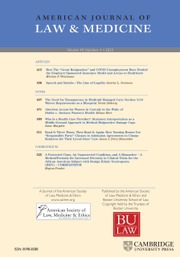No CrossRef data available.
Article contents
Liability of Manufacturers and Providers of Health Related Goods and Services: Confronting the Dilemma
Published online by Cambridge University Press: 24 February 2021
Abstract
In this Article, Theodore Cooper, M.D., Assistant Secretary for Health at HEW, contends that the crush of lawsuits brought by aggrieved health care consumers against medical professionals and institutions, and drug and medical equipment manufacturers, may be the result, in large part, of a widely held impression—often encouraged by members of the health professions and industries themselves—that medicine has unlimited powers to heal. Dr. Cooper suggests that those involved in providing health care services and products—and members of the legal profession—have a responsibility to inform the public that this expectation is unrealistic and that everyone suffers when the number of such lawsuits and the size of damage awards are excessive.
- Type
- ASLM Annual Oration
- Information
- Copyright
- Copyright © American Society of Law, Medicine and Ethics and Boston University 1977
References
1 National Swine Flu Immunization Act of 1976, Pub. L. No. 94-380. This Act amends the Public Health Service Act, § 317, 42 U.S.C. § 247b, by adding three additional subsections (j), (k), and (1), relating to the Swine Flu Program.
2 Under Pub. L. 380, individuals allegedly injured as a result of vaccination sue the United States; nevertheless, the U.S. has the right to recover from manufacturers for damages attributable to their negligence.




